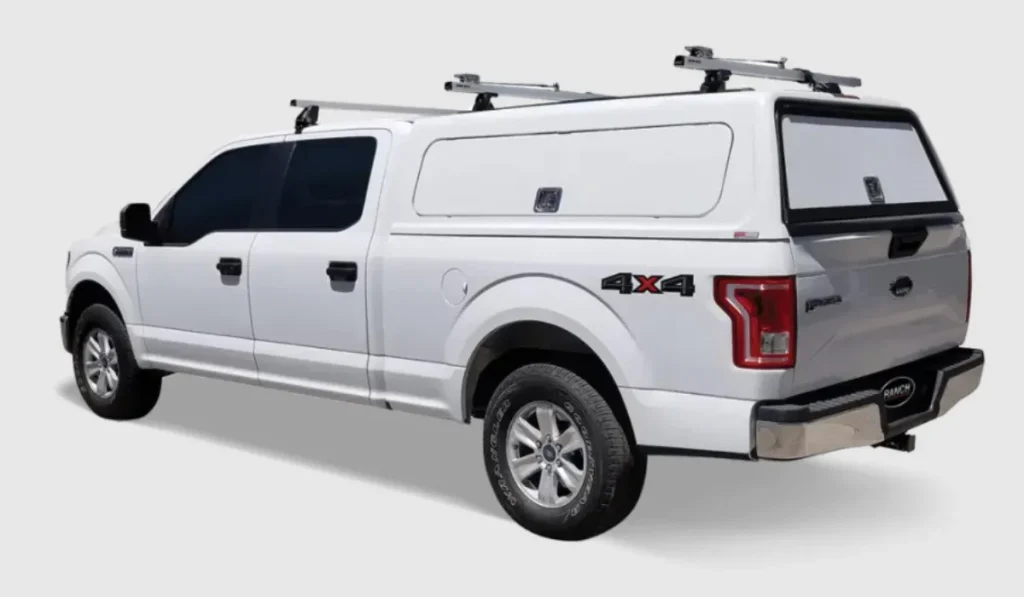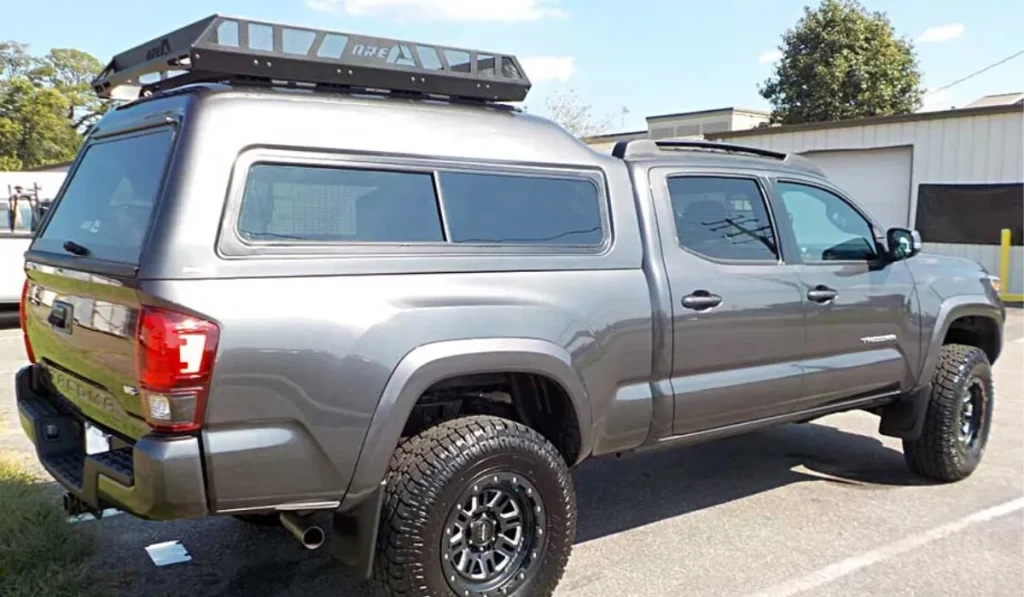A truck cap typically weighs between 50 to 200 pounds. The exact weight depends on the material and size.
Truck caps, also known as camper shells or toppers, are a popular accessory among truck owners looking to add utility and style to their vehicles.
These enclosures cover the bed of a pickup truck, providing security for cargo and sometimes even converting the space into a small sleeping area.
Available in a variety of materials, including aluminum, fiberglass, and plastic composites, truck caps cater to a range of preferences and needs.
Their weight is a key consideration for drivers as it affects fuel efficiency and the vehicle’s handling.
Lightweight options are preferable for those who prioritize economy, while sturdier, heavier caps might be favored for their durability and protection.
Selecting the right truck cap involves balancing these concerns with the intended use and budget constraints.
Introduction To Truck Caps
Truck caps, often known as toppers or canopies, transform pickups into versatile beasts. They add a protective layer, creating an enclosed space in the truck bed.
Owners use them for both work and play, securing cargo from the elements and theft. The question is, how much does this addition weigh?
The Role Of Truck Caps
Truck caps serve multiple purposes:
- Security – Safeguard your belongings.
- Weather Protection – Keep rain, snow, and sun at bay.
- Fuel Efficiency – Potentially reduce drag and save on gas.
- Style – Customize your truck’s look.
Variety And Materials
Truck caps vary in weight, depending on their build:
| Material | Weight Range |
|---|---|
| Aluminum | 50-100 lbs |
| Fiberglass | 100-200 lbs |
| Composite/Plastic | 65-180 lbs |
Choosing the right material involves balancing weight with durability and functionality.
Key Factors Affecting Truck Cap Weight

Understanding the factors influencing truck cap weight is crucial for truck owners. The right weight impacts fuel efficiency, vehicle performance, and load capacity. Let’s explore the key factors that affect the weight of truck caps.
Material Used
Different materials mean different weights for truck caps. Common materials include:
- Fiberglass: Offers a balance of durability and weight.
- Aluminum: Lightweight and good for fuel economy.
- Plastic: Usually the lightest option available.
Fiberglass caps are popular for their robust construction but they usually weigh more than aluminum or plastic caps.
Size And Design
The cap’s dimensions and shape also play a key role:
| Size | Typical Weight Range |
|---|---|
| Small | 50-100 lbs |
| Medium | 100-150 lbs |
| Large | 150-200 lbs |
A larger cap will generally be heavier. Aerodynamic designs may cut down on weight.
Additional Features
Extra functionalities add to the truck cap’s weight:
- Windows: Glass adds extra pounds.
- Roof Racks: Useful for cargo, but heavier.
- Interior Linings: Insulation and luxury come with a weight cost.
Each feature, like a roof rack or interior storage system, contributes to the overall weight of the cap.
Comparing Types Of Truck Caps
Truck caps add versatility and style to your vehicle. Yet, they differ in weight. The type you choose impacts your fuel consumption and payload. Let’s dive into the details of different truck cap types.
Fiberglass Caps
Fiberglass caps are popular for their sleek look. They blend well with the truck’s design. Their average weight is about 200 pounds.
- Durable
- Paint-matched to your truck
- Higher price point due to the material and finish
Aluminum Caps
Aluminum caps offer a lightweight solution. They usually weigh around 100 pounds. Their lighter weight means easier handling and less impact on gas mileage.
- Corrosion-resistant
- More affordable than fiberglass
- Functional and practical for everyday use
Commercial Caps
Commercial caps are for serious work. They weigh more due to built-in toolboxes and durability demands. A commercial cap can weigh upwards of 300 pounds.
- Extra storage solutions like shelving
- Stronger materials for heavy-duty use
- May require reinforced suspension due to added weight
Liftgate and reinforced roof capabilities often feature in commercial models. This adds weight but increases utility. Choose wisely based on your work needs.
| Type of Truck Cap | Average Weight |
|---|---|
| Fiberglass Caps | 200 lbs |
| Aluminum Caps | 100 lbs |
| Commercial Caps | >300 lbs |
The right truck cap should meet both your aesthetic and functional needs. The weight is a key factor to consider. Assess your daily requirements and make an informed choice.
Installation Implications

Laying the sturdy foundation for your truck cap installation is critical. The weight of a truck cap can influence your vehicle’s dynamics and capacity. Professionals assess these factors carefully.
This ensures your truck remains functional, safe, and legal post-installation. Let’s dive into how a truck cap’s weight might affect your ride.
Impact On Vehicle Performance
Understanding the weight of your truck cap is vital for maintaining vehicle health. Extra weight can alter your truck’s center of gravity.
This sometimes leads to changes in handling and stability. Fuel consumption can also rise, as your engine works harder to haul the additional mass. Take note:
- Increased braking distance might occur
- Suspension may experience extra stress
- Tire wear could be uneven
Proper installation minimizes these issues, preserving your truck’s lifespan and your on-road confidence.
Considerations For Carrying Capacity
Your truck’s payload capacity is the maximum weight it can carry, including a cap. Adding a truck cap uses a portion of this capacity.
It’s essential to assess your typical load alongside the cap’s weight. This calculation prevents overloading. Consider these key factors:
| Payload Component | Impact |
|---|---|
| Truck Cap Weight | Reduces available payload |
| Cargo Weight | Must factor in cap’s weight |
| Passenger Weight | Included in overall capacity |
Remember the gross vehicle weight rating (GVWR). Stay within this limit for safety. Also, distribute weight evenly across the truck bed to prevent imbalance.
An informed installation choice keeps your trips smooth and your cargo secure.
Maintenance And Care
Maintaining your truck cap ensures it stays in great shape for years. A well-cared-for cap adds style and utility to your truck.
It’s crucial to understand the weight of your truck cap. Proper maintenance affects its longevity. Let’s explore how to preserve the integrity of your cap.
Preserving Cap Integrity
Regular cleaning keeps your truck cap looking new. Use mild soap and water to wash it. Avoid harsh chemicals, they can damage the surface.
Inspect the seals frequently. They keep water and dust out. When seals show wear, replace them promptly to maintain a tight fit. Proper installation is critical. Ensure the cap is securely attached to prevent stress from movement.
- Wash with mild soap
- Avoid harsh chemicals
- Check and replace seals as needed
- Ensure secure installation
Weight Change Over Time
As truck caps age, they may experience weight change. This could be due to several reasons:
- Material degradation – Sun and weather can wear down materials, affecting weight.
- Add-ons – Over time, you might add accessories that increase weight.
- Wear and tear – Small repairs can add weight, like patching or sealant.
Keep track of modifications or repairs to your cap. An unexpected weight change might alter the handling of your truck.
For instance, the addition of roof racks can add weight. Always ensure changes do not exceed the cap’s weight capacity.
Making The Right Choice
Making the Right Choice for a truck cap involves balancing needs, budget, and quality. Truck owners understand that a cap adds function and style. Yet, it also affects vehicle dynamics.
Picking the proper cap ensures it complements the truck’s performance and aesthetic. Let’s explore how to select the best truck cap within budget and aligning with individual needs.
Assessing Needs And Budget
Choosing the right truck cap starts with a clear understanding of how the truck will be used. A heavy cap can handle more stress.
In contrast, a light one is easy on the suspension. Before making a selection, consider these key aspects:
- Usage: Daily tasks or occasional hauling?
- Material: Aluminum or fiberglass?
- Weight: Heavier caps offer robustness but affect fuel economy.
- Features: Extra options like windows and racks add weight and cost.
| Cap Type | Weight Range | Average Cost |
|---|---|---|
| Basic Aluminum | 50-100 lbs | $200-$400 |
| Fiberglass | 100-200 lbs | $700-$1000 |
| Commercial Caps | 200-400 lbs | $1000-$2000 |
Establishing a budget is critical. Remember, heavier and feature-rich caps cost more but offer more utility.
Decide what aspects are essential and which you can do without. A balance between necessity and affordability is key.
Seeking Expert Advice
Contacting a specialist ensures you get an appropriate truck cap. Professionals have extensive knowledge. They can anticipate needs you might overlook. Here are steps to get expert guidance:
- Schedule a consultation with a truck accessory shop.
- Discuss the truck’s primary use and any concerns.
- Ask about the weight implications of different cap types.
- Consider their recommendations on material and design.
Reaching out to a dedicated truck cap dealer or a seasoned truck customization expert is advisable.
They will guide you through the selection process. An optimal choice balances the truck’s capabilities, your demands, and the cap’s specifications. Always make an informed decision.
FAQs About The Weigh of A Truck Cap
What Is The Average Weight Of A Truck Cap?
Truck caps, commonly known as toppers or camper shells, averagely weigh between 50 and 200 pounds. The exact weight depends on the material, size, and features.
Are Fiberglass Truck Caps Heavier Than Aluminum?
Yes, fiberglass truck caps are typically heavier than aluminum ones. Fiberglass weighs more due to its thicker construction needed for added durability.
How Does A Truck Cap’s Weight Affect Fuel Economy?
A heavier truck cap can slightly decrease fuel economy by increasing aerodynamic drag and the overall weight of the vehicle. The impact is usually minor.
Can I Install A Truck Cap By Myself?
Installing a truck cap is possible alone, but help is recommended. Due to their weight and size, handling can be challenging, risking injury or damage to the truck.
Conclusion
Understanding truck cap weights is crucial for vehicle safety and performance. The average truck cap can weigh between 50 to 200 pounds, depending on material and features.
This knowledge enables proper vehicle handling and adherence to weight limits. Remember, always consult your truck’s manual and a professional for precise guidance and safe travel.
